Editor’s note: This blog post was written by a special guest, M. Elizabete Mendes, M.D., Ph.D., a clinical pathologist from the University of Sao Paulo, Brazil, and a CAP inspector in her country and in S.A. Dr. Mendes has been a visitor to our Department since January of 2012 and will be here until the end of March. Welcome, Dr. Mendes, and thank you for sharing with us!
My name is Dr. Maria Elizabete Mendes, and I am Chief of Blood Biochemistry and Coordinator of Quality and Sustainability of Central Laboratory Division of the Hospital das Clinicas in San Paulo, Brazil. I am happy to have the opportunity to inform you about the country of Brazil, the Brazilian health system, and the practice of clinical pathology in Brazil and there are many similarities between the discipline of clinical pathology in Brazil and the U.S.

Brazil – An Overview
Brazil is a federative republic in South America and has a large land area (8,500,000 square kilometers). It is the fifth largest country in the world. The Brazilian territory is located in the southern hemisphere; it is mainly a tropical country and its climate contains few extremes.
Brazil has a population of approximately 191 million people, making it the fifth largest nation in terms of population size. The growth rate of the population was at a high level in the middle of the 20th century, but gradually declined from 3% per year in the 1950s to 1.2% per year in the period 2000-2004. The country has a low birthrate (20.40 per 1,000 people) and a low infant mortality rate (6.31 per 1,000 live births). The effective decrease in infant mortality is due to specific actions in health and education and infant mortality has been treated as a priority public health problem. Changes in mortality and morbidity rates are related to progress and changes in epidemiological and nutritional factors, and demographics.
Today circulatory system diseases are the major cause the death, followed by cancer, and external causes (especially homicides and traffic accidents). According to the Brazilian Institute of Geography and Statistics, the population is 40.2% young people, 50.5% adults, and elderly 9.3%. The average lifespan is 73.5 years. Caucasians make up 41% of the population, and the racial composition of Brazil is quite varied. This diversity in population has not prevented Brazil from achieving a high degree of cultural unity. The Brazilian people share in common: past, ideals, tastes, and problems.
The literacy rate for Brazilians 15 years and older increased from 49% in 1950, to 61% in 1970, and to 88% in 2004.
Brazilian Economy
The Brazilian economy is regarded as the seventh largest in the world and is in development, and has recorded a growth of 2.7% for 2011. It has a gross domestic product per capita (GDP per capita) of U.S.$10,146, compared to the USA of U.S.$47,600.
My country has an export-oriented economy. The main exports are transport equipment, iron ore, industrial raw materials, soybeans, footwear, coffee, autos, automotive parts, and machinery. The primary trading partners of Brazil are the United States, the European Union, and Argentina.
The poverty index declined from 68% in 1970 to 31% in 2008; this improvement can be attributed to a combination of social policies and raises of the minimum wage. The unemployment rate as of February of 2012 in Brazil and USA is respectively 5.5 % and 8.3%.
The Brazilian Health System
The Brazilian health care system is comprised of a complex network of providers and purchasers of services. Coexisting are public services, the private for-profits and nonprofits, and the supplementary health sector, with different types of private health plans, the insurance policies, and fiscal subsidies. The public and private components are separate, but they interconnect. Brazilians can use the services of all the three sub-sectors, depending upon the facility.
Public Services
The National Health Policy, embodied by the Unified Health System (SUS), guarantees citizens’ right to health care. The basic pillars of SUS are universal access, equity, administrative-operational decentralization, social participation, intersectionality and participatory funding (cities, states, and federal government). In 2006 a Health Pact was introduced, an agreement for each government level to assure commitments are met based on mutual goals and responsibilities. To manage this decentralized policy, arrangements were expanded in the system to increase social involvement and alliance building among the main players.
Social determinants and healthcare needs also vary among the country’s regions. In the face of such complexity and inequity, the charge to promote health and combat disease in a continental country is not an easy task. In 2007, the government spent 8.4% of the gross domestic product on healthcare.
The access to health services in Brazil has improved considerably after the creation of SUS in 1988. The increase to the primary health care jumped 450% from 1981 to 2008. Health services are organized in primary, secondary attention and tertiary tiers. The primary care tier has the goal of providing universal access and comprehensive services, coordination and expanded coverage for more complex levels of care (e.g., specialized assistance and hospital), as well as implementing intersectional action for health promotion and disease prevention.
The secondary-care tier includes the medium complexity procedures. The SUS is highly dependent on contracts with the private sector, especially in the case of support services for diagnostics and therapeutics. Also, Brazil now has specialty dental centers, counseling services for HIV/ AIDS and other sexually transmitted diseases, reference centers, occupational health and rehabilitation services. In 2008, Units of Emergency Care (UPA) were created which operate 24 hours to relieve the demand in emergency departments.
Tertiary care involves complex and high-cost procedures which are provided by contracted private providers and university public hospitals. The challenges of Brazilian hospital care include the improvement of efficiency, cost control, quality assurance of health care and patient safety. The public sector has only 35% of hospital beds in the country. Since the number of beds in the public hospitals is not great enough for the demand, the government pays the private hospitals for the medical care of the patients insured by the government.
Private Healthcare Sector
Historically, health policies have stimulated the private health sector in Brazil and have promoted the privatization of healthcare, through credentialing of medical offices, or by the remuneration and creation of the diagnostic services and specialized therapeutic clinics (such as mental health).
In accordance with National Health Agency, nearly 45 million of Brazilians are recipients of private health insurance, i.e. insurance companies, private pension. 77.5% of all Brazilians are covered by private insurance companies.
The private insurance plans are focused primarily in the young and healthy population. They offer plans with various levels of freedom of choice to the providers of the health care. As the demand is stratified by socioeconomic and occupational status of each person, the quality of care and the facilities available to the employees from the same company may vary significantly, e.g., executives’ plans are more comprehensive compared to other employees.
The majority of users of those plans are immunized in the basic health units, and they receive the complex procedures of high costs, such as hemodialysis and transplantation, by the SUS. With the continued expansion of the private’s sector, which is subsidized by the state, there is an underfunding the public sector. This generated a potential compromise of its ability to ensure the quality of care and the population’s access to services. In 2000 the National Supplementary Health Agency was established to ensure the legally and administrative regulation of the market of private health insurance. Brazil has 6,384 hospitals, of which 69.1% belong to private sector. Nearly 39% of private hospital beds are available to SUS, via contracts.
The Lab Market
It is estimated that the laboratory market in Brazil has a growth rate of about 7.3% per year and totals approximately US $2.3 billion annually. This market is split with about 12,000 labs and 45,000 collection sites. Most laboratories are composed of small and distributed throughout the country with up 20 staff, and mainly for outpatients. Approximately 15% of the market is concentrated among six major private networks.
In the last years there has been a trend for state governments to outsource clinical pathology services to private laboratories.
There are good reasons to be optimistic about the laboratory market in Brazil — economic stability brings a greater concern about quality of life and expands awareness of preventive care. In the Brazilian population, the aging and chronic diseases are the leading cause of visits at primary care facilities. We know that nearly 60-70% of medical decisions are based on laboratory test results.
The Payments
In the USA there is currently a hybrid system of payments for laboratory services, with payment made by an examination (fee for service) or by number of patients covered (with pay level). The payments are made by examination (examination fee) in Brazil.
Training of Pathology Employees
Laboratory technicians follow a three-year curriculum in high school that combines theoretical and practical aspects.
Biochemists are graduates of a four-year college. Following graduation, the biochemist would do a specialized residency which lasts two years, rotating in the large areas of the lab; and if one wants to specialize in a particular area, an additional year would be required. All biochemists must pass the rigorous examinations of the Brazilian Society for Clinical Analyses in order to be certified.
Upon completion of six years in medical schools, our clinical pathologists enter residency programs regulated by the Ministry of Education. The first year is spent in either medicine or pediatrics, followed by a two-year in rotation in the larger areas of the laboratory. It is optional to have an additional year as a subspecialty, considered “on the job training.” To be certified, the doctor must pass boards of the Brazilian Society of Clinical Pathology/Laboratory Medicine Brazilian Medical Association. Following certification, the clinical pathologist must meet a minimum score of continuing education annually set by the Brazilian Society of Clinical Pathology/Laboratory Medicine.

Labor Market
The Brazilian clinical laboratories, like the Americans labs, need various multidisciplinary professionals working together harmoniously to achieve success. Staff include doctors and nurses, lab technicians and biochemists, managers, economists, clinical engineers, electronic technicians, experts in all areas of information technology (software, hardware, logical network, graphic designers and information’s security), work safety techs, and environment techs.
Other job opportunities for lab professionals in Brazil are in government agencies, the diagnostic industry, technical support, specialized consultants, education at the technical, graduate and postgraduate levels, professional societies, laboratory unions, and as lobbyists for laboratory legislative interests.
Technological Advances Inside the Labs
The Brazil clinical laboratories employ state of the art instrumentation like that available in the United States, and the instrumentation is imported. Our pathologists are generally in accordance with updates from the global market, especially by closely following the trends in the U.S. Our point-of-care protocols and instruments are very similar to that in the U.S.
The latest generations of automated analyzers in immunochemistry, hematology and microbiology are in the medium- and large-sized laboratories in every region of the country.
It is worth noting that the Brazilian laboratories managers rarely purchase large lab equipment; most labs buy service and are charged at the price per determination, or lease or rent of equipment.
High complexity testing is available in both public and private laboratories that also act as reference labs. Testing includes molecular diagnostic, flow cytometry, HPLC, mass spectrometry, TDM, and cytogenetic testing.
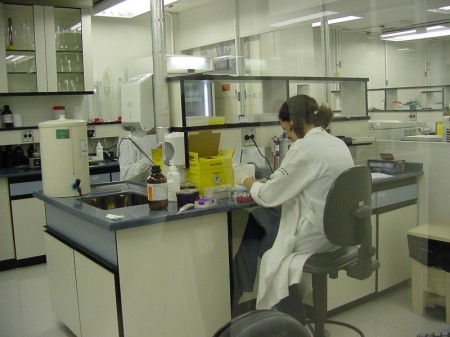
Molecular Biology Lab Employees
Hospital das Clínicas of Medicine School of University of Sao Paulo (HC- FMUSP)
My hospital opened 68 years ago and is linked to the Brazilian Health State Secretary who collaborates with us on education, research and clinical care, from primary to high-complexity care. The hospital’s complex is 352,000 square meters with approximately 2,200 beds distributed among its six specialized institutes, plus two auxiliary hospitals, a division of rehabilitation, and an associated oncology hospital. Its core values are ethics, humanitarianism, social responsibility, pluralism, pioneering and institutional commitment.

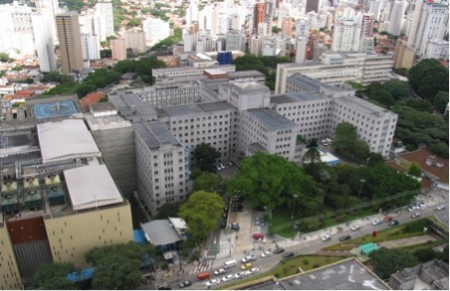
Hospital das Clínicas of Medicine School of University of Sao Paulo
Central Laboratory Division
The Central Laboratory Division (DLC) serves the entire Hospital complex described above, as well as other basic healthcare facilities in the region west of Sao Paulo. The DLC is situated on an area of 5,000 square meters and performs about 11 million tests per year, with an average of 3,500 patients/day of whom 45% are in-patients. We have 500 employees: 4% clinical pathologists, 30% nursing staff, 28% lab technicians, 24% biochemists, 10% administrative team, and 4% IT staff.
The DLC is accredited by both the Brazilian Society of Clinical Pathology/Laboratory Medicine and the College of American Pathologists. It has the following certifications: ISO 9001, ISO 14001, and ISO 18001.
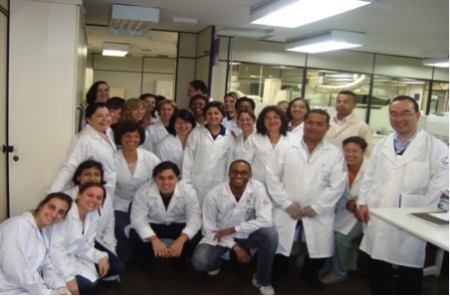
DLC leadership and staff. Dr. Nairo Massakazu Sumita, Clinical Chemistry Service Director, is on the far right in the foreground.
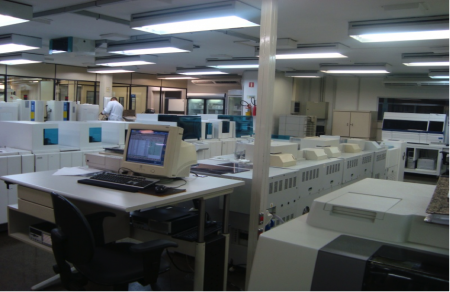
The clinical biochemistry area of the Lab
DLC’s Challenges
“Everything changes but change itself.” Heraclitus (ca. 540-470 BC)
In the last three years the growth rate was 30% per year due to the expansion of the Hospital complex and tests performed in the city of Sao Paulo. To meet this tremendous demand the DLC should conduct a reorganization of its facilities to modernize and prepare the lab for horizontal integration and consolidation because these areas are currently separated in different blocks. The LIS should be optimized to meet this new reality. New technologies such as mass spectrometry can be applied to hormonal tests, and more TDM and microbiology introduced routinely. To prepare the lab people for new competencies and to properly communicate the changes are among the major challenges leadership is facing, as well optimizing teaching and research. In conclusion, in future we must do better, be more efficient, and make patient safety a priority, while respecting the environment and promoting job satisfaction for our employees. As you can see there are many similarities among what we experience in DLC and you herein the Department of Pathology of Johns Hopkins.
Maria Elizabete Mendes, M.D., Ph.D.
Clinical Pathologist
Central Laboratory Division
Hospital das Clínicas of Medicine School of University of Sao Paulo (HC- FMUSP)

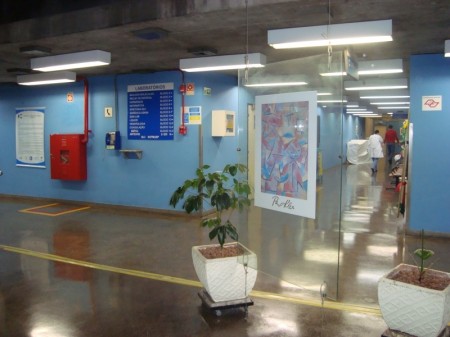
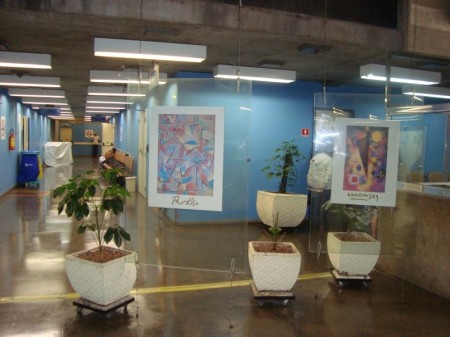
It is wonderful to see again a Brazilian, as our Dr. Maria Elizabete Mendes, a medical doctor in the area of clinical pathology, advancing towards the important exchange of knowledge, information and technologies in support of health. I sure that the partnership between the U.S. and Brazil strengthens the links, are productive and gives us a better quality of the sectors most in need of courage and commitment of professionals. I Love it. I’m your fan. Hug.
Doctor Maria Elizabete and I have worked together for years. She has not only been my friend at work, but also has taught me a lot about organization and development. She has helped me through my PhD tesis, which title was “Parasitology Laboratories Quality Analisis in São Paulo – Brazil” and though she is the chief of the Biochemistry Lab, she has a wide range of knowledge, which gives her the gift of undertending everything and being able to deal with Clinical Pathology matters.
Bete, I congratulate you, my friend! We are are so proud of you and we have great joy to have you on our team! We miss you!
Yours faithfully,
Vera.
Dra. Bete
Parabéns! Pelo trabalho realizado com muita dedicação, competência, e com certeza ótimos resultados. Fiquei muito feliz em poder compartilhar com esta mensagem. Desejo que usufrua deste momento, com muita alegria, saúde e paz.
A gente vibra com as vitórias dos amigos, principalmente quando a gente é amiga de longa data, que Deus te ilumine e abençõe sempre em sua caminhada. (usei o tradutor do Google).
Parabéns Dra Bete muito bonito blog e até breve
Parabéns! todo sucesso do mundo! você merece pelo seu trabalho e competência, adorei o blog.
e nós estamos sempre vibrando com suas vitórias. Até breve
Dra Bete,
Vc como guerreira é merecedora de todos os sucesos conquistados e a conquistar!
Que Deus ilumine seu caminho hoje e sempre!
Até breve
Parabens Dr .Bete, gostei do blog,felicidades!
Beth,
Your text is very good and provides a good overview of our country, our health care system, our Hospital, and especially of our Laboratory. Congratulations!
Dr. Mendes is good to know that this period is contributing to your knowledge. For surely when you return to Brazil, we all grow with your experience at this renowned institution.
Hugs.
Dear. Dr. Beth, Congratulations for an achievement!
I am proud to know that a coworker shines around and also long distance.
God protect you, bless you and grant you much wisdom.
Sincerely,
Nana
“Nenhum trabalho de qualidade pode ser feito sem dedicação e esforço …. “Parabéns pela conquista!!!!
Bete, o meu maior orgulho é ter tido a oportunidade de conviver 6 anos de minha vida profissional com vc e toda a equipe do laboratorio Central da FMUSP, onde recebi uma formação solida em Patologia Clínica, além de ter encontrado e preservado amigos como voce. Parabens pelo sucesso! Um beijao e ate maio!
Prezada Dra Bete, boa tarde ! Parabens pelo Blog, está muito bonito, com excelente conteúdo. Estou feliz pelo seu sucesso e sinto-me orgulhoso de ser seu amigo e poder compartinhar com você de mais uma conquista.
Marcos Munhoz
Dear, Dr. Bete, We are very happy with your news and hope that your goals are met.
Take care and God bless you.
Leo/dlc
Dra. Beth
Parabéns pela oportunidade e conquista!!!
Abraços
Simone Cunha
Congratulations Dr. Beth for another certificate. Congratulations on your persistence and dynamics to achieve its goals. I believe that soon we will again here. Be welcome. God bless you.
Dear Bete,
Your presentation is really a wonderful display of all the effort and commitment of our Lab Staff. Thank you for showcasing it and letting other people know how the Health Care System works here in Brazil. You are a role model to all of us and I admire your determination and strong will. I wish your experience at such renowned institution will help us improve the quality of our lab even more. I hope you’ll have the best time there. Best wishes!
Dear Bete,
I believe all your partners miss you the last three months. Our administrative reunions was not the same without you. I hope you have enjoyed your visit at John Hopkins facilities, it is always rewarding stay a period in another country. I wish to you enjoyable time with the people you like in the US and have a good trip back to Brazil.
Best regards,
Alex
So many congratulations – that here’s another.
Doctor, this work was great, I liked too.
I am delighted to tell colleagues that work with a good and intelligent person with this degree of training, we are proud to be represented by this person there in the U.S.
Dra Bete Boa Tarde!
Parabéns pela conquista.
Você merece.
Surely Dr. Beth (or “Bete” for brazilians) has a height inversely proportional to their potential – and pardon the pun!
Only a professional like her to stay ahead of the biochemistry laboratory of the largest hospital in Latin America, linked to a university of international excellence as the University of São Paulo (USP).
Congratulations by the text, especially for the description of the Brazilian Health System – it was a real lesson!
I believe that the excellence of the work developed in the laboratory of HC-FMUSP must have impressed even the high-level professionals at Johns Hopkins.
Congratulations and carry on! 🙂
Ps: The photo in front of the John Hopkins was great!
It is always good to see someone who really knows Brazil speak about this beautiful country. Additionally Dr. Bete Mendes goes deep in the health system, specially in the grounds of which is the benchmark for health systems in Brazil … should it be for the world?
Thank you for sharing. Wish you the best.
Alex Srabotnjak, a Brazilian
Lincensed Paralegal in Ontario, Canada
Congratulations,
Dr. Beth, from the day that you interviewed me, I noticed that you had many qualities, one of which is its great capacity and competence. I hope we can work many, many years from now on ……
Parabéns pelo seu belo trabalho, fruto da sua incansável dedicação e empenho. Muito sucesso!!
Dear Bete,
You wrote a wonderful review about our country and healthcare system, perhaps a little bit too optimistic. I hope you enjoyed your stay at Johns Hopkins. We are anxiously waiting for your return to introduce in DLC everything you learned in Baltimore.
Dear Bete,
Congratulations for your Blog. It presents very well the many topics of our country and the lab.
I am glad about this opportunity you had in your life, which is an achievement due to your efforts.
Thanks a lot for being able to participate on this moment as your friend. God bless you. Hugs !!!
Regina Mingroni Souza
Dra Maria Elizabete ,
Orgulha-nos saber que profissionais do gabarito da Doutora expresse com tanta veracidade nosso sistema de saúde.
Experiencias como estas deveriam tornar-se uma constancia.
Muito Obrigado
Parabéns pelo trabalho executado.
We health professionals, we are very pleased that we have in our country a health care system as good as the country experiences.
I’m happy to read a story that adds a lot of our knowledge, such programs should be further encouraged, not only for the benefit of my country, but extended to the world.
Thank you, Dr. Elizabeth Mendes, a reputable professional, responsible for the largest pathology laboratory in South America.
Congratulations !!
Dr Beth, I feel proud to be your friend and I admire the professionalism that you apply to all your projects. I hope you can reap the good fruits of this sowing, ever. I miss you and I’ll wait for your return. Best wishes.
Dr. Bete, parabéns por mais esta conquista. O blog está bem legal!
Bjos Nilcéia.
Parabéns, Dra Bete! Sua conquista foi merecida, desejo muito sucesso e sei que você vai conseguir muito mais, pela sua inteligência, dedicação e competência! Beijos
Dra. Bete,
Parabéns. Mais uma vez está provando que é uma pessoa dotada de muita inteligência, capacidade, força de vontade e destreza em tudo que faz.
Felicidades.
Lia Lavorato
Dr. Bete
Parabéns por mais esta conquista, pois isto é resultado de seu esforço e competência.
Dra. Bete,
Parabéns pelo seu blog, e pelo sucesso que está fazendo aí no JHH.
Volte logo para nos transmitir todas as novidades…..
Parabéns,
Dra. Bete, gostei muito do blog, e desde o dia da minha entrevista, sempre soube da sua grande potencial, tantas descobertas te conduziram a essa nova fase de aprendizado em um dos lugares de maior importância e reconhecimento….
Dra. Bete,
Parabéns por mais essa conquista!!!!
Volte logo!!!! Saudades….
Evelyn
Dra.Bete, congratulations for this amazing experience. We all know that you could do it.
I hope you’ll bring new things for us, so we can improve our tasks.
See you soon,
Luciane
Dra. Bete, parabéns pelo trabalho !!!! O blog está muito bacana !!!
Beijos e bom retorno !!!!
Parabéns Dra. Elizabe, gostei da apresentação de seu blog, do conteúdo escrito e também da sua foto, que lindas as flores ao fundo!!!!!! Bom regresso, Heico
Dear Dr Bete,
Congratulations. You did a complete and beautiful work. The details of Brazil’s public health and our laboratory were so carefully explained.
Best regards,
Dra Bete, parabéns por mais esta conquista, vc merece. É a pessoa mais empenhada que já conheci e este laboratório não é o mesmo sem sua presença. Felicidades. Letícia.
Dra. Bete
Para realizar grandes conquistas, devemos não apenas agir, mas também sonhar; não apenas planejar, mas também acreditar.
Parabéns por mais esta conquista. O blog está muito bom.
Wladimir
Dra. Bete.
É com grande satisfação, que venho lhe parabenizar por mais esta conquista. Orgulho-me de fazer parte desta instituição tão conceituada e de trabalhar com pessoas com o seu profissionalismo e empenho no dia-a-dia. Tenho certeza que esta última conquista é fruto de muito trabalho e dedicação, como todas as outras que o Laboratório Central conseguiu com a sua ajuda.
Abraços,
André Ap. Pereira
Dear Bete.,
I’m sure you did a great job there as you do here everyday.
I hope you’ve had a very nice time there and also that you can teach us even more than you’ve already done all these years as our leader.
We miss you very much.
Have a nice trip back.
Best regards, Luciane Bussmann & ICESP Team.
Dra. Beth
Adoramos seu blog, estamos muito animados e orgulhosos de participar do seu grupo de trabalho.
Beijos do pessoal da Urinálise.
Dra.Beth
Parabéns por mais esta conquista, a senhora merece.
Beijos! Bom retorno.
Dear Bete
Congratulations for such a terrific description of Brazil, its demographic features, the health care system and the overview of our Hospital (HCFMUSP). Those who know you can achieve the real importance of your sabbatic at the JHU. Your seriousness and tremendous capacity of hard working and the systemic view of the management of processes and projects can stimulate all of us to try to follow your footsteps in the search for quality, either in clinical labs or in research labs, like ours (LIM56).
With my best regards,
Dewton Vasconcelos
Dra Bete,
Parabéns pelo excelente trabalho, que demonstra o seu valor como profissional e resultado de sua trajetória de luta e determinação
É um prazer ter a oportunidade de pertencer ao seu grupo.
O trabalho exposto, com riqueza de detalhes, sem perder a sutileza que lhe é peculiar, relata nossa realidade e traz a público o que já sabíamos sua, seriedade, luta e determinação, para atingir seus propósitos além de enaltecer a Divisão de Laboratório Central do Hospital das Clínicas da Universidade de São Paulo.
Parabéns